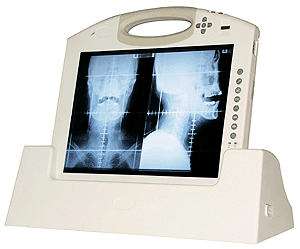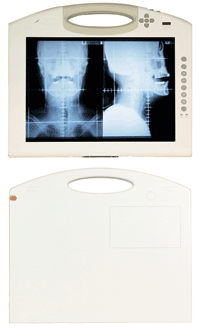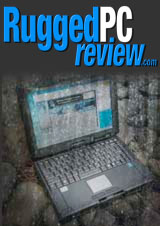Arbor M1256 Mobile Clinical Assistant
Ruggedized, Atom-powered MCA with 12.1-inch wide-format 1280 x 800 display
(by Conrad H. Blickenstorfer)
As a follow-up to their M1255 Mobile Clinical Assistant introduced in early 2009, Arbor Technology Corp. of Taiwan presents the Arbor M1256 Mobile Medical Assistant, a device loosely based on Intel's mobile clinical assistant (MCA) platform that was introduced in February of 2007 together with the Motion Computing C5 as the first representative of the genre.  Intel's idea behind MCAs was to create a class of mobile computers designed and optimized for clinical environments where light weight, spill-resistance, the ability to absorb the occasional drop and, most importantly, quick and easy cleaning and disinfection matter. Intel's idea behind MCAs was to create a class of mobile computers designed and optimized for clinical environments where light weight, spill-resistance, the ability to absorb the occasional drop and, most importantly, quick and easy cleaning and disinfection matter.
With a good decade of experience in embedded and industrial systems, Arbor is a competent designer/manufacturer well versed in anything from board-level components to fully integrated solutions. This expertise means they can create new products very quickly and also easily adapt them to customer demands. In this instance, Arbor realized that it would be a good idea to add an MCA class device to its roster of medical solutions that also includes panel computers, point-of-care terminals, smaller tablets, and embedded system components.
 The Arbor M1256 device generally follows the Intel MCA reference platform, which means it is a thin slate with an integrated handle that is, or can be, equipped with a 2D bar code scanner and a RFID reader for easy data capture. It also has an integrated 2-megapixel camera. Physically, the device has a footprint of 12.1 x 10.9 inches and it is just about an inch thick. That's larger, but not thicker, than the competition. Weight is said to be just 3.5 pounds. Unlike all other current MCAs, the Arbor M1256 has a 12.1-inch display, considerably larger than the 10.4-inch screens used in all other MCAs. The display also uses the trendy wide-format 16:10 aspect ratio with 1280 x 800 pixel resolution. That means there are 33% more pixels than the competition has, and this could be quite an advantage. The 12.1-inch display, which has a fairly powerful 300 nits CCFL backlight (notebooks usually have less than 200 nits), makes the computer larger, though apparently not much heavier—it still weighs less than four pounds. The M1256 has a analog resistive touchscreen, but no active digitizer. The Arbor M1256 device generally follows the Intel MCA reference platform, which means it is a thin slate with an integrated handle that is, or can be, equipped with a 2D bar code scanner and a RFID reader for easy data capture. It also has an integrated 2-megapixel camera. Physically, the device has a footprint of 12.1 x 10.9 inches and it is just about an inch thick. That's larger, but not thicker, than the competition. Weight is said to be just 3.5 pounds. Unlike all other current MCAs, the Arbor M1256 has a 12.1-inch display, considerably larger than the 10.4-inch screens used in all other MCAs. The display also uses the trendy wide-format 16:10 aspect ratio with 1280 x 800 pixel resolution. That means there are 33% more pixels than the competition has, and this could be quite an advantage. The 12.1-inch display, which has a fairly powerful 300 nits CCFL backlight (notebooks usually have less than 200 nits), makes the computer larger, though apparently not much heavier—it still weighs less than four pounds. The M1256 has a analog resistive touchscreen, but no active digitizer.
Under the hood, the M1256 has a 1.6GHz Intel Atom N270 processor with the accompanying chipset that consists of the Intel 945GSE and ICH7M modules. This is the chip that drives millions of netbooks. There is one 200-pin SODIMM slot for either 512MB or a gigabyte of DDR2 memory. The standard disk is a 1.8" 60GB PATA model, with an 80GB disk also available. There is Bluetooth v2.1 and a 802.11 WiFi mini-PCIe card that supports 802.11a/b/g/n. There is a fingerprint scanner, but no SmartCard reader. A GSM/GPRS/EDGE or CDMA/EVDO Sierra Wireless module is also available to provide wide area wireless network communication.
On the battery side, things are not totally clear. There is mention of an internal 3-cell battery that is good for 3.5 hours, and a reference to dual external hot-swappable 1,880 mAH batteries that extend battery life to 4.5 hours.
MCA usually do not have onboard connectors because a) they don't need them as they are usually used with a docking station, and b) ports make a device more prone to attracting dirt and bacteria, and they are more difficult to clean. From the looks of it, the M1256 is very easy to clean and disinfect, with no onboard ports and a totally smooth and flat backside. Connectivity is available through the docking station: Four USB, VGA, gigabit LAN, serial, and even optional GPS.
As far as ruggedness goes, the M1256 can handle multiple drops to concrete from three feet and passes MIL-STD-810F 516.5 Procedure 1 that measures functional (i.e. operating) shock. The machine also provides full IP54 sealing and has a wide operating temperature range (32 - 113 degrees Fahrenheit).
For operation, the M1256 has more buttons and controls than most tablets. There's a 5-way navigation pad, and buttons for locking the display, record, start video, capture pictures, read RFID tags, scan barcodes, select language, record sound, as well as power and SAS (Secure Attention Sequence, also known as Ctl-Alt-Del).
How does the Arbor MCA measure up? It has a larger display than anyone else, more resolution, and it uses the modern "wide" screen format. It looks like a sleek, functional and easy-to-clean design, and it uses the trendy N270 Atom processor. However, while the wide-format 12.1-inch display alone may give this machine an advantage, it only has a touch screen and not a digitizer and we'd like to see more battery life from an Atom-powered machine. The MCA market is becoming increasingly competitive and the stakes are high, so all newcomers will be measured against the likes of Motion Computing's C5, Panasonic's CF-H1 and Advantech's MICA-101.
|
|
|
 Specs ARBOR Gladius M1256
Specs ARBOR Gladius M1256
|
|
Added
|
04/2009
|
|
Type
|
Mobile Clinical Assistant
|
|
OS
|
Microsoft Windows XP, Vista, or Linux
|
|
Processor
|
Intel Atom N270, 512MB L2 cache, 533MHz FSB, 2.5 watt TDP
|
|
CPU Speed
|
1.6g GHz
|
|
Chipset
|
Intel 945GSE + Intel ICH7M
|
|
Standard/Max RAM
|
1GB DDR2 SODIMM in one 200-pin slot
|
|
Disk/drive
|
1.8-inch PATA 60GB or 80GB hard disk
|
|
Optical drive
|
NA
|
|
Card slots
|
none external
|
|
Display type
|
TFT, 300 nits CCFL backlight; Viewing angle 140 degrees horizontal, 125 degrees vertical
|
|
Display size/res
|
12.1" WXGA (1280 x 800 pixel)
|
|
Digitizer/pens
|
Analog resistive touch screen
|
|
Keyboard/scale
|
Onscreen keyboard
|
|
Housing
|
Plastic/rubber (double injection tooling design)
|
|
Operating Temp
|
32 - 113 degrees Fahrenheit
|
|
Sealing
|
IP54
|
|
Shock
|
Operating, 40G peak (11m sec.), crash 75G (11m sec.)
|
|
Transit drop
|
Multiple 3-foot drops onto concrete (bare machine)
|
|
Vibration
|
5 ~ 500Hz (3 axes: X, Y, Z), 1G PTP
|
|
Humidity
|
8-80% non-condensing (operating)
|
|
Size (WxHxD)
|
12.1 x 10.9 x 1.0
|
|
Weight
|
3.8 pounds (with internal and dual external battery)
|
|
Power
|
Internal 3-cell Li-Ion 2,000mAH (?V) "3.5 hours", also dual external 4-cell 1,880mAH (?V) hot-swappable ("4.5 hours")
|
|
Interface
|
2.0mp CMOS camera, speaker, fingerprint scanner, 1 USB 2.0, dock; via dock: 3 USB 2.0, VGA, gigabit RJ45, RS232 serial
|
|
Wireless
|
802.11a/b/g/n WiFi via mini-PCIe card, Bluetooth, 13.56MHz RFID, 2D barcode scanner, optional CDMA/EVDO or GSM/GPRS/EDGE module (Sierra MC5727 or MC8790); optional GPS in vehicle cradle
|
|
List price
|
Unknown
|
|
Spec sheet
|
M1256 specsheet
|
|
Contact
|
Arbor Medical Solution
|
|
|
Definitions/Primers
|
|
What does "rugged" mean?
Rugged Specs Primer
Intrinsic Safety
NEMA Ratings
IP Rating
RFID
RFID vs. Bar Code
RFID viruses and
worms
|
|
Search
|
|
|
|



